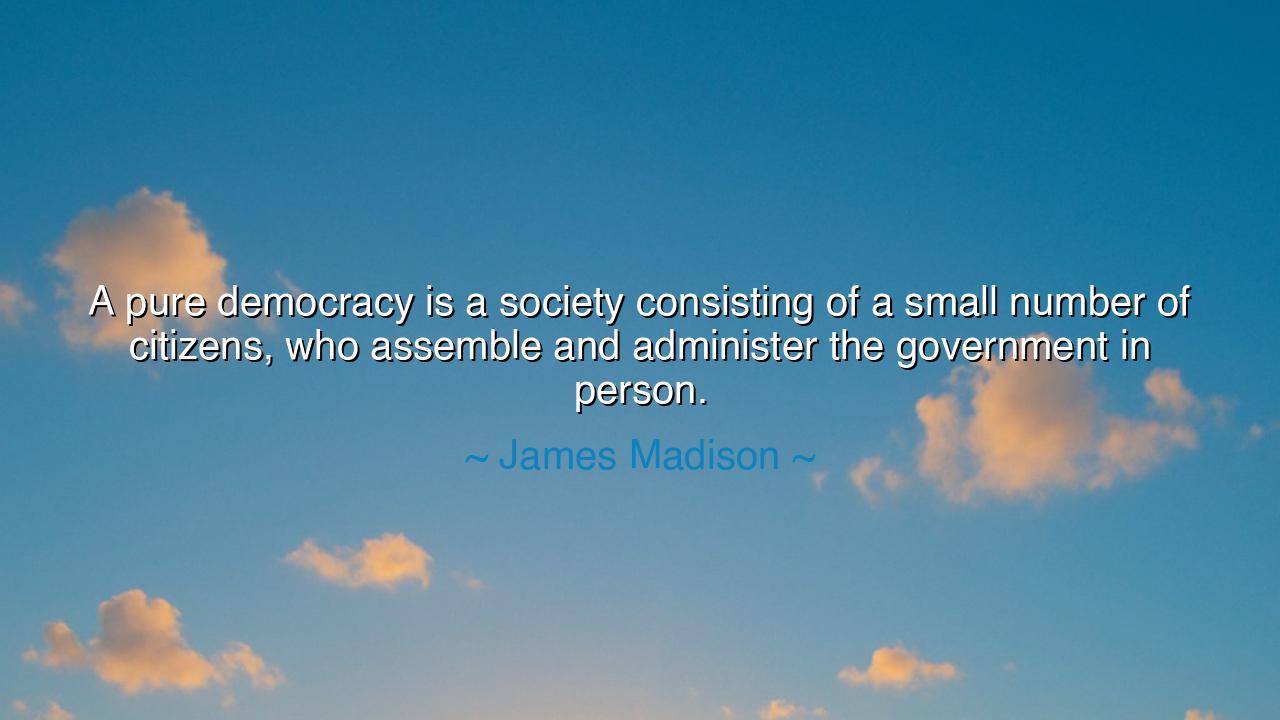
A pure democracy is a society consisting of a small number of
A pure democracy is a society consisting of a small number of citizens, who assemble and administer the government in person.






“A pure democracy is a society consisting of a small number of citizens, who assemble and administer the government in person.” So wrote James Madison, the father of the American Constitution, a man whose mind was both visionary and cautious — one who sought not only to build a nation, but to preserve it from its own passions. His words, though calm on the surface, carry the weight of experience and foresight. They are not a mere definition, but a warning drawn from the deep wells of history. For in this statement, Madison reminds us that pure democracy, though noble in theory, is fragile in practice, and that the voice of the people must be guided by the structure of law lest liberty consume itself.
In these words, Madison reflects upon the lessons of the ancient world, whose republics and city-states had long since risen and fallen by the time America was born. He had studied the histories of Athens, Sparta, and Rome, and he saw how each, in its own way, suffered from the excesses of unbridled democracy. In Athens, the citizens ruled directly — they gathered in the assembly to make laws, to wage wars, and to judge their fellow men. But passion often triumphed over reason. One day the people celebrated heroes; the next, they condemned them to death. The same hands that raised Socrates to honor voted soon after to poison him. Thus Madison saw that when every citizen governs, no one governs wisely.
The origin of this quote lies in The Federalist Papers, that sacred dialogue of the founding generation, wherein Madison and his peers wrestled with the question: how can a free people remain free? Writing in Federalist No. 10, he sought to explain the difference between pure democracy and the new form he called a republic. In a pure democracy, he said, all citizens gather to decide every question directly; but in a republic, they choose representatives to deliberate and govern on their behalf. The first, though born of equality, is easily swayed by emotion, faction, and haste. The second, though less immediate, allows time for wisdom, reflection, and restraint.
Madison’s insight was not contempt for the people, but trust in their reason — so long as it was shielded from the storms of sudden passion. He believed that liberty without structure becomes anarchy, and that justice without moderation becomes vengeance. Therefore, the Constitution was built not as a monument to pure democracy, but as a fortress for balanced self-government — one where the people are sovereign, yet their power flows through channels of law and representation. It was this balance, delicate yet enduring, that preserved the American experiment where others had fallen.
Consider, then, the story of the Athenian Assembly — the birthplace of democracy. It was a city of brilliant minds and courageous spirits, yet it was undone by the very freedom it cherished. The people, in their zeal, voted for wars they could not win and punished leaders who spoke the truth they did not wish to hear. Their democracy, once radiant, collapsed into tyranny, first of the mob, and then of the despot. Madison studied these tragedies and resolved that America must learn from them — that passion must be tempered by reason, and that freedom must be bound to structure and virtue.
In his wisdom, Madison also foresaw the dangers of faction, that eternal disease of free societies. He knew that when groups pursue their own interests above the common good, they become wolves disguised as citizens. In a small democracy, such factions quickly devour one another; but in a republic — large, diverse, and mediated through law — the clamor of interests balances itself, allowing liberty to endure. Thus, Madison’s vision was not to destroy democracy, but to perfect it — to transform its chaos into harmony through the art of governance.
And so, O listener, what lesson shall we take from his ancient truth? That liberty requires more than voice — it requires discipline, knowledge, and humility. The citizen must not only demand freedom but understand its weight. To govern is not merely to speak, but to deliberate; not merely to vote, but to think. In our age, where the passions of the crowd are magnified by the noise of countless voices, Madison’s wisdom calls to us anew: do not let democracy become a tempest of impulse. Build within it the calm of reason, the structure of law, and the virtue of patience.
For the strength of a nation lies not in the loudness of its people, but in their wisdom to rule themselves. A pure democracy, left to impulse, burns bright and dies young; but a republic, tempered by prudence and guided by principle, endures through the ages. So let us remember Madison’s words not as a restraint upon freedom, but as a compass for its survival — for only by tempering our power can we be truly free, and only by governing with wisdom can liberty last beyond our lifetimes.






AAdministratorAdministrator
Welcome, honored guests. Please leave a comment, we will respond soon